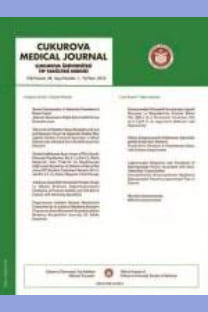Klinik hemşirelikte eleştirel düşünme: içerik analizi
Kritik, Düşünme, Nitel Araştırmalar, Hemşireler
Critical thinking in clinical nursing: a content analysis
Critical, Thinking, Qualitative research,
___
- 1. Ismail Azizi-Fini, Ali Hajibagheri, Mohsen Adib-Hajbaghery. Critical thinking skills in nursing students: a comparison between freshmen and senior students. Nurs Midwifery Stud. 2015;4:e25721
- 2. da Costa Carbogim F, de Oliveira LB, de Araújo Püschel VA. Critical thinking: concept analysis from the perspective of Rodger’s evolutionary method of concept analysis. Rev Lat-Am Enferm. 2016;24:e2785.
- 3. Zori S, Nosek LJ, Musil CM. Critical thinking of nurse managers related to staff RNs’ perceptions of the practice environment. J Nurs Scholarsh. 2010;42:305–13.
- 4. Banning M. Clinical reasoning and its application to nursing: concepts and research studies. Nurse Educ Pract. 2008;8:177-83.
- 5. Özkahraman Ş, Yıldırım B. An overview of critical thinking in nursing and education. Am Int J Contemp Res. 2011;1:190-6.
- 6. Tajvidi M, Ghiyasvandian S, Salsali M. Probing concept of critical thinking in nursing education in Iran: a concept analysis. Asian Nurs Res. 2014;8:158–64.
- 7. Fero LJ, O’Donnell JM, Zullo TG, Dabbs AD, Kitutu J, Samosky JT et al. Critical thinking skills in nursing students: comparison of simulation-based performance with metrics. J Adv Nurs. 2010;66:2182–93.
- 8. Por J. A critical engagement with the concept of advancing nursing practice. J Nurs Manag. 2008;16:84–90.
- 9. Edwards SL. Critical thinking: a two-phase framework. Nurse Educ Pract. 2007:7:303–14.
- 10. Reid H. The correlation between a general critical thinking skills test and a discipline specific critical thinking test for associate degree nursing students (Doctorate dissertation). Denton, Texas, University of North Texas, 2000.
- 11. Jenkins SD. Cross-cultural perspectives on critical thinking. J Nurs Educ. 2011;50:268–74.
- 12. Alfaro-LeFevre R. Critical Thinking and Clinical Judgment: A Practical Approach to Outcome-Focused Thinking. St. Louis, MO, Saunders, 2009.
- 13. Tucker TM, Predictors of critical thinking as a component of an outcomes assessment in a graduate level school of social work (Doctorate dissertation). Louisville, University of Louisville, 2008.
- 14. Broome ME, Rodgers BL, Knafl KA. Concept Development in Nursing: Foundations, Techniques and Applications, 2nd ed. New York, WB Saunders, 2000.
- 15. Hsieh H-F. Three approaches to qualitative content analysis. Qual Health Res. 2005;15:1277–88.
- 16. Elo S, Kyngäs H. The qualitative content analysis process. J Adv Nurs. 2008;62:107–15.
- 17. Chinn PL, Kramer MK. Integrated Theory & Knowledge Development in Nursing, 8th ed. St Louis, MO, Elsevier, 2013.
- 18. Vaismoradi M, Turunen H, Bondas T. Content analysis and thematic analysis: implications for conducting a qualitative descriptive study. Nurs Health Sci. 2013;5:398-405.
- 19. Graneheim UH, Lundman B. Qualitative content analysis in nursing research: concepts, procedures and measures to achieve trustworthiness. Nurse Educ Today. 2004;24:105-12.
- 20. Polit DF, Beck CT. Essentials of Nursing Research: Appraising Evidence for Nursing Practice. Philadelphia, Lippincott Williams & Wilkins, 2010.
- 21. Cope DG. Methods and meanings: credibility and trustworthiness of qualitative research. Oncol Nurs Forum. 2014;41:89-91.
- 22. Geng F. An content analysis of the definition of critical thinking. Asian Soc Sci. 2014;10:124-8.
- 23. Salsali M, Tajvidi M, Ghiyasvandian SH. Explaining the concept of critical thinking from the perspective of nurses. The Journal of Urmia Nursing and Midwifery Faculty. 2013; 11:714-722.
- 24. Chabeli MM. Facilitating critical thinking within the nursing process framework: a literature review Health SA Gesondheid. 2007;12:69-89.
- 25. Lunney M. Use of Critical thinking in the diagnostic process. Int J Nurs Terminol Classif. 2010;21:82–8.
- 26. Forneris SG. Exploring the attributes of critical thinking: a conceptual basis. Int J Nurs Educ Scholarsh. 2004;1:Article9.,
- 27. Forneris SG, Mc Alpine CP. Creating context for critical thinking in practice: the role of the preceptor. J Adv Nurs. 2009;65:1715–24.
- 28. Kaya H, Senyuva E, Bodur G. Developing critical thinking disposition and emotional intelligence of nursing students: a longitudinal research. Nurse Educ Today. 2017;48:72-77.
- 29. Madadkhani Z, Nikoogoftar M. Critical thinking in nurses: predictive role of emotional intelligence. Journal of Hayat. 2015;20(4):77–88.
- ISSN: 2602-3032
- Yayın Aralığı: Yılda 4 Sayı
- Başlangıç: 1976
- Yayıncı: Çukurova Üniversitesi Tıp Fakültesi
Özge PEKİN İŞERİ, Özgül KARAYURT, Sezai YILMAZ
Yaygın idiopatik nekrobiyozis lipoidika: olgu sunumu
Sebahattin DESTEK, Vahit Onur GÜL, Serkan AHİOĞLU
Tonsil non-Hodgkin lenfomalı hastaların değerlendirilmesinde FDG-PET/BT'nin değeri
Nagihan BİLAL, Adin SELÇUK, Bora BİLAL, Göksel KÜTÜK
Türk populasyonunda maternal MTHFR geni polimorfizmleri ve Down sendromlu çocuk sahibi olma riski
Nurşen KESER, Ayfer PAZARBAŞI, Lütfiye ÖZPAK
Faruk EKİNCİ, Rıza Dinçer YILDIZDAŞ, Özden Özgür HOROZ, Engin MELEK, Ercüment PETMEZCİ, İlknur TOLUNAY
Vijayendranath NAYAK, Raghavendra KİNİ, Prasanna Kumar , RAO, Gowri BHANDARKAR, Roopashri Rajesh KASHYAP
Perkütan trakeastominin olağan dışı komplikasyonu: trakeaözofageal defekt
Cerrah için yanıltıcı bir cilt lezyonu: piyoderma gangrenozum
Güllü KORKMAZ SOLMAZ, Harun ÇÖLOĞLU, Murat DURDU, Nilgün ERTAŞ
